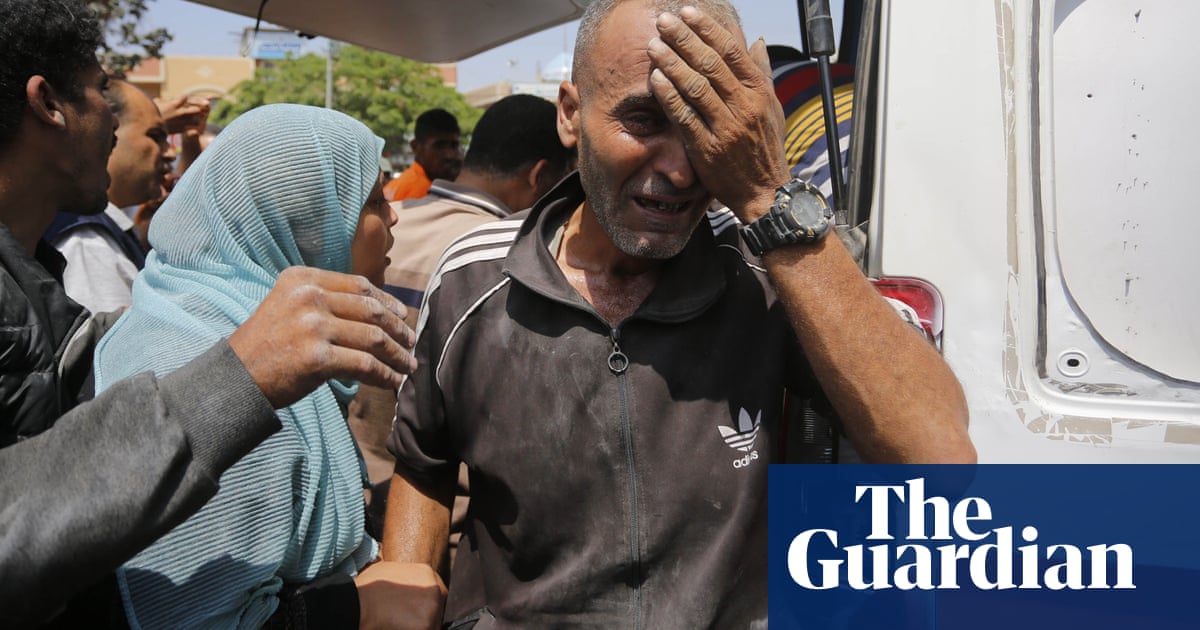At least 27 people have been killed and dozens injured in an Israeli strike on a UN school housing displaced people in al-Nuseirat, in the central Gaza Strip, the Hamas-run Gaza government media office has said.
It accused the Israeli army of carrying out a “horrific massacre … that shames humanity”. Palestinian news agency Wafa said at least 32 people had been killed. There was no immediate confirmation by the health ministry, and the death toll could not immediately be verified.
Footage on X posted by Palestinian journalists in the early hours of Thursday showed rows of bodies laid out at al-Aqsa hospital in Deir al-Balah, and wounded children being treated on the floor.
The Israeli military confirmed on X that it had targeted a UN school in al-Nuseirat, saying that it had been home to Hamas terrorists who had taken part in the 7 October attack on Israel. “Terrorists” who had been planning to carry out attacks in the immediate future had been “eliminated”, it said, and that “many steps were taken to reduce the chance of harm to those not involved”.
The attack on the school run by Unrwa, the UN refugee agency for Palestinians, follows the announcement on Wednesday by the Israel Defense Forces (IDF) of a new operation against Hamas in central Gaza, with Palestinian medics saying airstrikes had killed dozens of people.
The charity Medicines Sans Frontiers (MSF) said that since Tuesday at least 70 dead and more than 300 wounded, mostly women and children, had been brought to al-Aqsa hospital after “heavy Israeli strikes” in central Gaza.
Karin Huster, an MSF medical adviser in Gaza, described the situation as “overwhelming”. “There are people lying everywhere on the floor, outside … bodies were being brought in plastic bags,” she said on X.
An Israeli military statement said of the new operation: “The forces of the 98th Division began a precise campaign in the areas of East Bureij and East Deir al-Balah, above and below ground at the same time.”
Residents said Israeli forces had sent tanks into Bureij and planes and tanks pounded the nearby settlements of al-Maghazi and al-Nuseirat as well as Deir al-Balah city.
The armed wings of Hamas and Islamic Jihad said they had fought gun battles with Israeli forces in areas throughout the territory and fired anti-tank rockets and shells.
Abu Mohammed Abu Saif said two of his children were among the dead brought to al-Aqsa hospital after the earlier Israeli strikes. “This is not war, it is destruction that words are unable to express,” he said, adding that his children had been killed along with their mother, who had been unable to leave when others in the neighbourhood did.
Al-Aqsa hospital is one of the last hospitals functioning in Gaza. Earlier in the night it reported an electrical generator failure, which risked complicating the treatment of patients.
Israel also reiterated on Wednesday its refusal to halt the Gaza offensive for a resumption of hostage-release talks with Hamas, with defence minister Yoav Gallant quoted by Israeli media as saying, “Any negotiations with Hamas would be conducted only under fire.”
Hamas leader Ismail Haniyeh meanwhile said the group would demand a permanent end to the war in Gaza and Israeli withdrawal as part of a ceasefire plan.
“The movement and factions of the resistance will deal seriously and positively with any agreement that is based on a comprehensive ending of the aggression and the complete withdrawal and prisoners swap,” Haniyeh said.
Asked whether Haniyeh’s remarks amounted to the group’s reply to Biden, a senior Hamas official replied to a text message from Reuters with a “thumbs up” emoji.
The comments dealt an apparent blow to a much-touted truce proposal put forward last week by US president Joe Biden.
Israel’s military assault on Gaza has killed more than 36,000 people, according to health officials in the territory, who say thousands more dead are feared buried under the rubble. The war was sparked by an unprecedented attack by Hamas in southern Israel in October last year, killing about 1,200 people.
On Wednesday two new food security reports reported that many Palestinians in Gaza had been killed by months of extreme hunger while permanent damage had been caused to children through malnutrition, even before famine is officially declared.
The US-based famine early warning system network (Fews Net) said it was “possible, if not likely” that famine began in northern Gaza in April. Two UN organisations said more than 1 million people were “expected to face death and starvation” by mid-July.
Israel has blocked the entry of much aid and fuel to Gaza, and cut off most of the water supply.
Israel’s prime minister, Benjamin Netanyahu, has meanwhile threatened an “extremely powerful” response to attacks by Hezbollah from Lebanon, which have escalated in recent days and set off huge fires in northern Israel.
Reuters and Agence France-Presse contributed to this report

